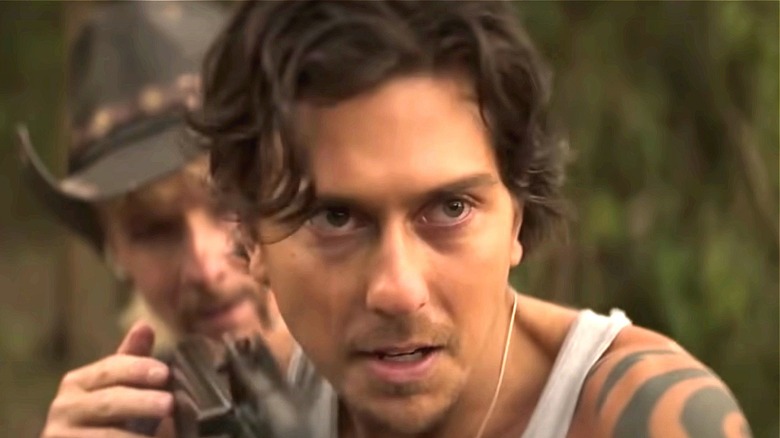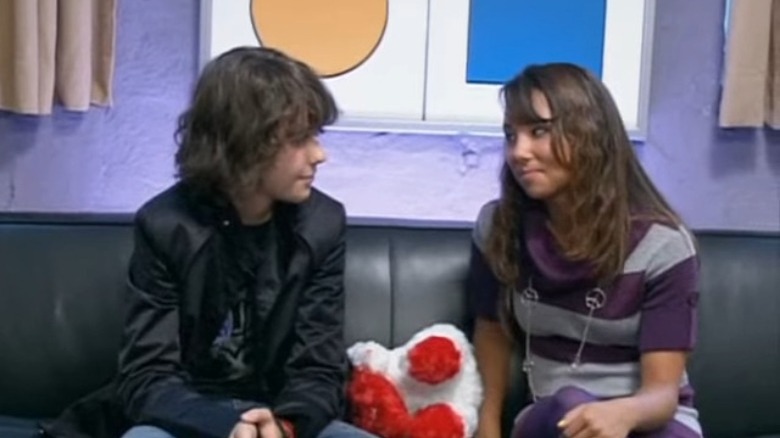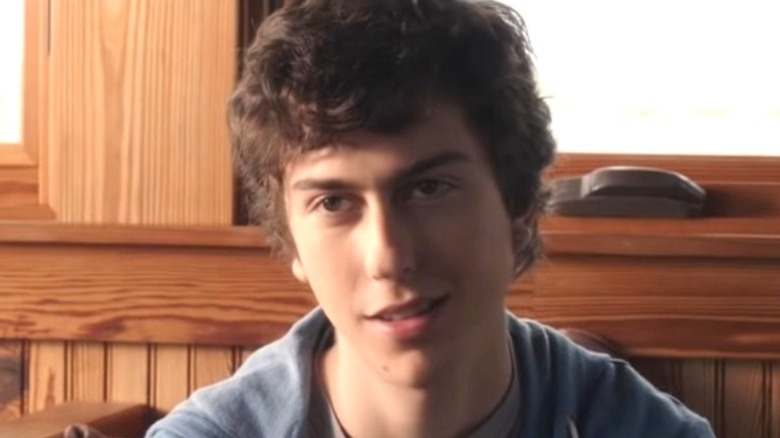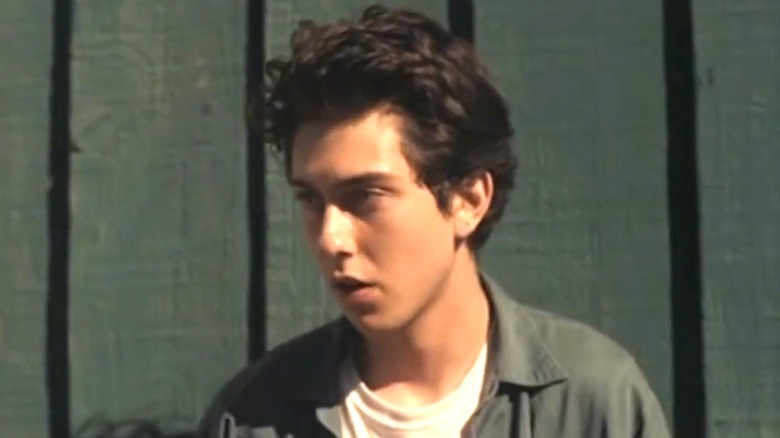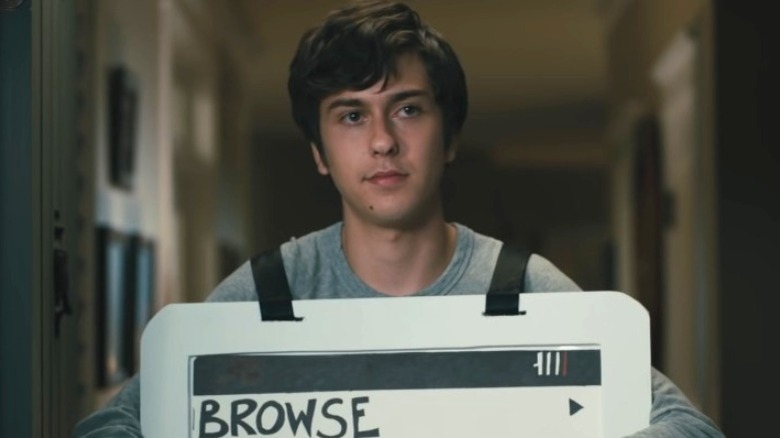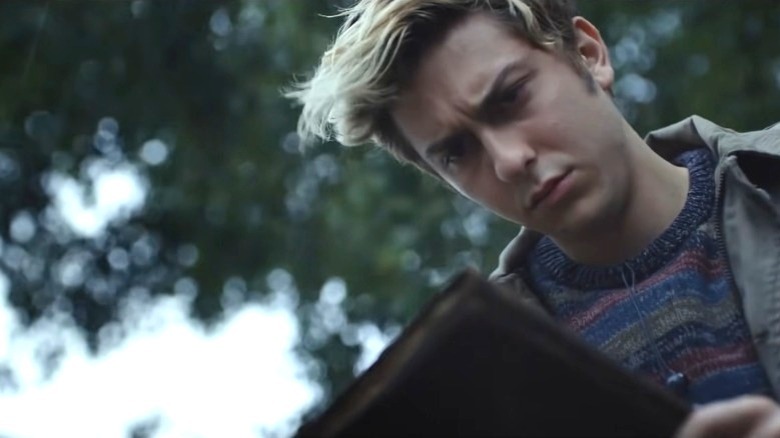Why Travis From Joe Vs. Carole Looks So Familiar
The real-life "cast" in the Joe Exotic saga, as documented on the Netflix documentary series "Tiger King," is peppered with eccentric, fascinating characters. So it stands to reason that its dramatized limited series adaptation, "Joe vs. Carole," would share that same defining feature. And, in the Peacock original show's case, there's also the added bonus of watching actors we know from other ventures transform into the people we've already seen so much of on TV screens.
There is, of course, star John Cameron Mitchell, holding down the center of the whole endeavor with his intensely committed, counterintuitively apposite performance as Joe Exotic. Then there's Kate McKinnon, ever the resourceful impressionist, as Carole Baskin, and nothing less than Kyle MacLachlan as her husband, Howard. In addition to the central cast, however, one supporting actor who's bound to draw particular attention is the one who plays Travis Maldonado, Exotic's young, ill-fated husband. Here are a few of the places you might remember this firecracker of a performer from.
Nat Wolff started out as one half of the Naked Brothers Band
Although the role of Travis on "Joe vs. Carole" couldn't be more distant from tween sitcom antics, the role that helped Nat Wolff break out — and arguably the one he's most associated with to this day for younger fans — was his performance as himself on Nickelodeon's "The Naked Brothers Band."
Adapted by Wolff's filmmaker mother, Polly Draper, from a successful 2005 feature film she'd previously directed, "The Naked Brothers Band" was a family affair from top to bottom: Nat's brother, Alex Wolff, also starred as himself, while their father and Draper's husband, Michael Wolff, played their in-universe father (via Viacom). The show, conducted in an innovative mockumentary format, fictionalized the exploits of the titular band as they attempted to reach the top of the charts while holding on to some semblance of normal teen life. Veritable renaissance boy that he was, Nat Wolff actually wrote and performed most of the songs featured in the series.
He played one of the three male leads in the multistory rom-com Stuck in Love
Following the conclusion of "The Naked Brothers Band," Nat Wolff continued to find his way to movie and TV sets, and one of those roles was in the indie romantic dramedy "Stuck in Love."
The 2012 film, which served as the feature directorial debut of Josh Boone ("The Fault in Our Stars," "The New Mutants"), focuses on three parallel stories in the ballpark genre of romantic comedy, with one family, the Borgenses, at the center. Wolff played the family's son, teenager Rusty Borgens, who is desperately yet ineffectually in love with his classmate Kate (Liana Liberato).
The plot sees novelist father Bill (Greg Kinnear) paying his children, Rusty and Sam (Lily Collins), to write in their journals about their experiences with love and relationships. This leads Rusty to confront the fact that he's used to observing life without really living it –— something he may or may not be able to change by way of his budding proximity to Kate.
Palo Alto earned him the best reviews of his career
"Palo Alto" may not have made as much of a splash with mainstream audiences as some of Nat Wolff's better-known projects — more on those in a minute — but it allowed him to give what would become, pretty handily, his most acclaimed performance.
A moody, subtly intense arthouse drama about the emptiness and ennui of teenagers' lives in the city of Palo Alto, California, the Gia Coppola-directed film is ostensibly centered around April (Emma Roberts), a shy wallflower who is being courted by her soccer coach (James Franco). But the environment surrounding April is every bit as crucial to the film's exploration of a particular sociocultural temperament, and among the other teens making up the tapestry of "Palo Alto," the one that gets the most attention from the script is resident troublemaker Fred.
A borderline sociopath with terrifyingly destructive and cruel behavior tendencies, Fred epitomizes the film's sense of creeping unease simmering under the Palo Alto doldrums. Nat Wolff's brilliant performance, which managed to make Fred both a memorably unhinged antagonist and an effectively understandable product of his time, place, and circumstances, drew enormous praise from critics (via The Atlantic).
His turns in John Green movies made him world-famous
While "The Naked Brothers Band" was exported to many foreign markets and seen by a lot of people around the world, the most widely seen Nat Wolff project is, naturally, "The Fault in Our Stars." Wolff had a supporting role in the film playing Isaac, the goofy and resolutely good-humored best friend of Augustus Waters (Ansel Elgort). But the relative lack of screen time, at least compared to Gus and Hazel Grace (Shailene Woodley), did not stop him from leaving his mark on the imaginations of YA fans.
After that, there was no one more fitting than Wolff, really, to headline the next John Green film adaptation. And sure enough, Wolff played Quentin "Q" Jacobsen in the 2015 film "Paper Towns." His vivid chemistry with fellow lead Cara Delevingne made the movie what it was, showing that Wolff had the chops to star as the protagonist in more films.
Netflix's Death Note was controversial, as was Wolff's performance in it
It's always an uphill battle for a live-action Western adaptation of anime to win over appreciators of the original work — just ask "Cowboy Bebop." Even calibrating for that fact, however, there's no talking around the fact that Netflix's adaptation of Takeshi Obata and Tsugumi Ohba's manga series "Death Note" utterly failed to please inveterate fans, professional critics, and casual viewers alike (via Rotten Tomatoes).
The debate over whether the film is purposefully campy and preposterous or just plain bad also extends to its central performance. As protagonist Light Turner, Nat Wolff was about as true to the essence of the source material character as a bulldozer is true to the essence of a tree, but the film's defenders would argue that Wolff's weirdness and inappropriateness are part of his brilliant performance. Whichever side you come down on, the fact is that the role is a hard one to forget.
